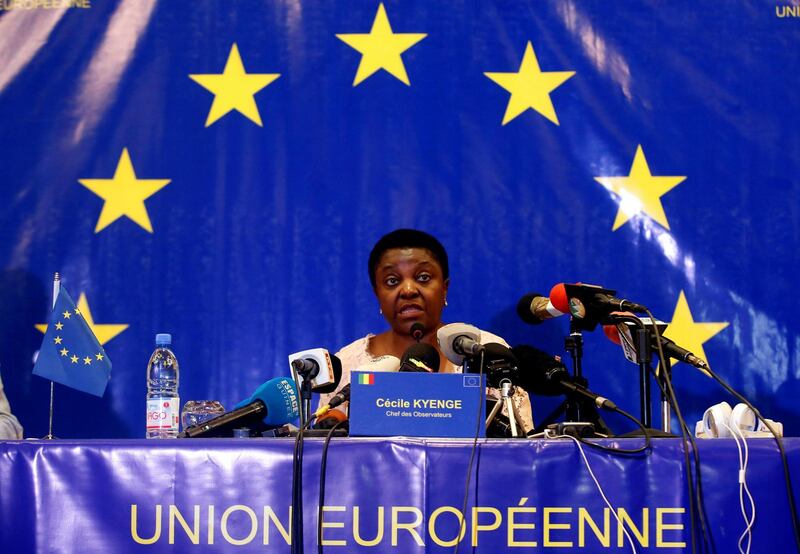The United Nations and European Union called for restraint in Mali on Tuesday after the opposition candidate said he would reject the results of a presidential run-off.
Provisional results of the face-off between president Ibrahim Boubacar Keita, 73, and former finance minister Soumaila Cisse, 68, are expected on Wednesday, according to an official source.
The president’s camp claimed on Tuesday that he would be re-elected by a “comfortable” margin.
“We are calmly waiting for the official results which will be announced shortly by the competent authorities,” the president’s campaign manager Boukary Treta told the media.
Opposition leader Mr Cisse said on Monday he would reject the results of the vote, which was marred by violence, low turnout and accusations of fraud.
_______________
Read more:
[ Mali opposition leader rejects results as counting under way ]
[ Malians vote in presidential run-off amid attacks and threats ]
_______________
He called on “all Malians to rise up ... (against) the dictatorship of fraud”.
“Responsibility for what is going to happen in this country lies with the president’s side,” he declared.
In New York, UN Secretary-General Antonio Guterres called on “all parties to remain calm through the conclusion of the electoral process” and avoid “incendiary rhetoric”.
The EU mission called on candidates to “show restraint” and “avoid announcing their own result estimates before the results are published”.
Mr Cisse’s team and other opposition contenders have repeatedly accused the government of fraud, including ballot-box stuffing and vote-buying.
“The fraud is proven, this is why there are results we will not accept,” Mr Cisse said at his party’s headquarters in Bamako on Monday.
He said the computer programme his party uses to tally votes – which had put him in the lead until then – had been hacked.
His team also said half a dozen of their members were detained for two hours in a Bamako police station and their phones and laptops had been seized.
The second round saw one election worker killed and hundreds of polling stations closed on security grounds, although this was still only a small percentage of the 23,000 stations nationwide.
Both the EU and the African Union (AU) said the election had not been badly impaired.
“Our observers did not see fraud but irregularities,” EU mission chief, Cecile Kyenge, said. African Union (AU) election observers said the voting was carried out “in acceptable conditions,” in a preliminary report published Monday.
The three main opposition candidates had mounted a last-ditch legal challenge to the first-round result, but their petition was rejected by the Constitutional Court.
Mr Keita is a clear frontrunner in the vote. In the first round on July 29, he was ahead, with 42 per cent against 18 per cent for Mr Cisse.
He had been fiercely criticised on the campaign trail for his handling of Mali’s security crisis, but Mr Cisse failed to rally other parties to his flag.
Voter enthusiasm for the run-off – a repeat of the 2013 battle that saw Mr Keita come to power – was poor. Turnout was just 22.38 per cent, a local monitor called POCIM (the Mali Citizen Observation Pool) said.
Anecdotal evidence on Tuesday suggested his fierce rhetoric was not being matched by the public mood.
“The day after the vote, people are starting to forget the election,” political analyst Souleymane Drabo told AFP.
“People are now preparing Tabaski,” Mr Drabo said, using the West African name for the Islamic festival of Eid Al Adha taking place next week.
“They need to buy a sheep. The election has already been pushed in the background.”
Mali, a landlocked nation home to at least 20 ethnic groups where the majority of people live on less than US$2 (Dh7.35) a day, has battled extremist attacks and inter-communal violence for years.
Extremist attacks have spread from the north to the centre and south of the vast country and spilled into neighbouring Burkina Faso and Niger, often inflaming communal conflicts.
The international community hope the winner of the election will strengthen a 2015 peace accord between the government, government-allied groups and former Tuareg rebels.





